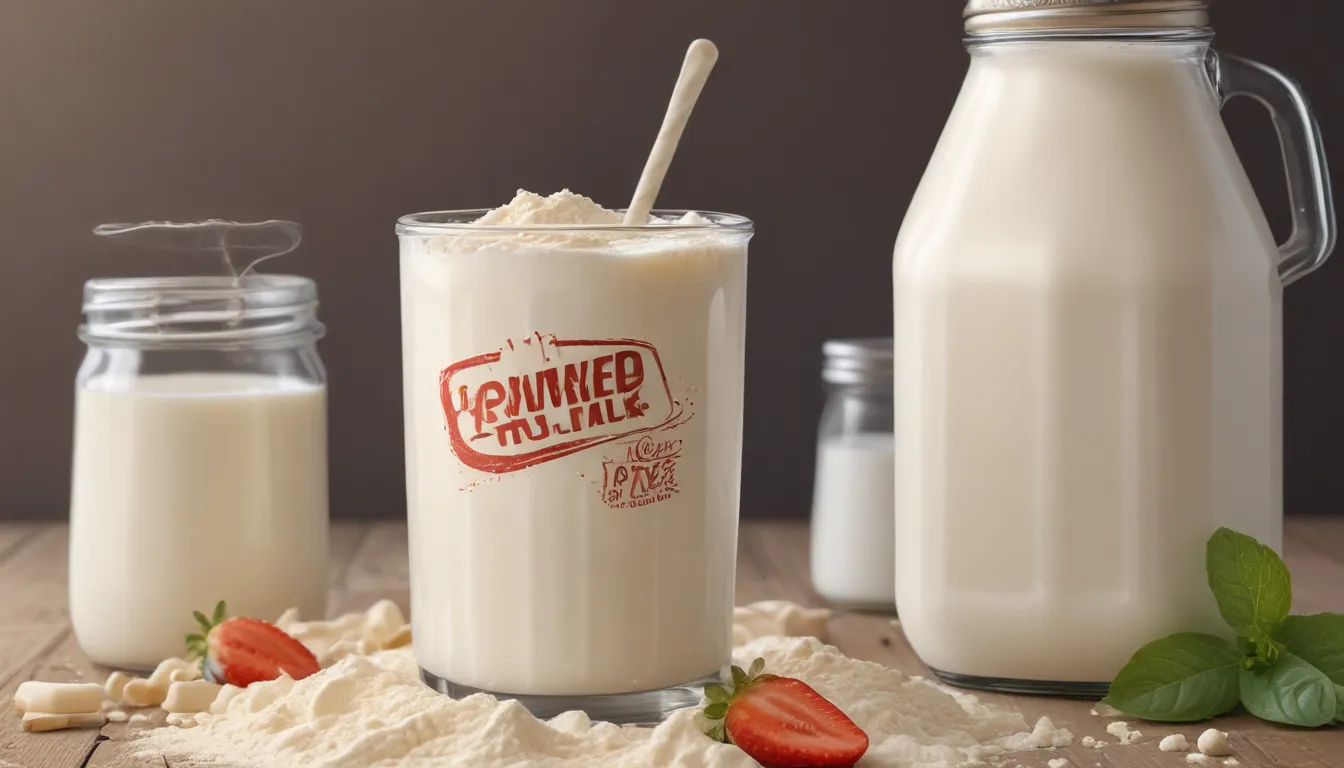The pictures in our articles might not always show exactly what the text is talking about. We use these images to make the article more interesting and eye-catching. They are there to add to the text, but not to replace it or show every detail.
In today's fast-paced world, finding nutritious and convenient food options can be a challenge. Powdered milk, also known as dried milk or milk powder, has emerged as a versatile and practical solution that offers a range of health benefits. Whether you're a health-conscious individual, a busy parent, or an outdoor enthusiast, powdered milk can be a valuable addition to your diet. In this article, we'll delve into the nutritional facts of powdered milk and explore its positive impact on your overall health and well-being.
The Nutritional Powerhouse of Protein
Protein is an essential nutrient that plays a crucial role in building and repairing tissues, supporting immune function, and maintaining overall health. Powdered milk is a concentrated source of protein, containing approximately 8 grams of protein per 30-gram serving. By incorporating powdered milk into your daily diet, you can easily meet your protein requirements and promote muscle growth and repair.
A Strong Foundation with Calcium
Calcium is vital for maintaining strong bones and teeth, as well as supporting proper muscle and nerve function. Powdered milk is an excellent source of calcium, providing approximately 276 milligrams per 30-gram serving. Regular consumption of powdered milk can help in maintaining healthy bones and reducing the risk of conditions like osteoporosis.
A Treasure Trove of Vitamins and Minerals
Powdered milk is fortified with essential vitamins and minerals, making it a valuable addition to your nutritional intake. It contains significant amounts of vitamin D, which aids in calcium absorption, and vitamin A, essential for vision and immune function. Additionally, powdered milk is rich in essential minerals like potassium, magnesium, and phosphorus, which support various bodily functions.
Embrace the Low-Fat Lifestyle
For those seeking a low-fat alternative to traditional milk, powdered milk is an excellent choice. Unlike whole milk, powdered milk is typically low in fat, with only around 2 grams of fat per 30-gram serving. Choosing powdered milk can help in reducing overall fat intake while still enjoying the nutritional benefits of dairy.
A Lifesaver with Long Shelf Life
One of the remarkable advantages of powdered milk is its extended shelf life. When stored correctly, powdered milk can last for months or even years without spoiling. This makes it an ideal option for emergencies, camping trips, or situations where fresh milk may not be readily available. Its long shelf life ensures you always have a reliable source of dairy on hand.
The Culinary Chameleon: Versatility at Its Best
Powdered milk is incredibly versatile and can be used in a myriad of recipes. From baking bread and cakes to preparing creamy sauces and desserts, powdered milk adds a rich and creamy flavor to dishes. It can also be reconstituted with water to create a nutritious alternative to fresh milk in beverages like smoothies or coffee. Its versatility makes powdered milk a staple in kitchens worldwide.
A Dairy Delight for the Lactose-Intolerant
Individuals with lactose intolerance often face challenges in digesting lactose, the sugar found in milk. Powdered milk contains significantly lower levels of lactose compared to fresh milk, making it more tolerable for those with lactose intolerance. Choosing powdered milk allows lactose-intolerant individuals to enjoy the nutritional benefits of milk without discomfort.
Your Travel Companion: Convenient and Portable
Traveling can present obstacles when it comes to accessing fresh and nutritious food options. Powdered milk comes to the rescue as a portable and lightweight source of dairy. Whether you're on a road trip or exploring remote areas, powdered milk can be easily packed and reconstituted with water whenever you need a quick and nutritious beverage.
Budget-Friendly and Nutritious
From a financial perspective, powdered milk often proves to be a more budget-friendly option compared to fresh milk. It offers a cost-effective solution for families or individuals looking to save money without compromising on the nutritional value of dairy products. By incorporating powdered milk into your daily routine, you can enjoy the benefits of milk while staying within your budget.
A Greener Choice: Sustainable and Eco-Friendly
Opting for powdered milk can have environmental benefits as well. With its longer shelf life, powdered milk reduces the amount of milk wasted due to spoilage. Additionally, powdered milk requires less packaging and transportation, resulting in a smaller carbon footprint compared to fresh milk. Choosing powdered milk aligns with sustainability goals and promotes eco-friendly practices.
Conclusion: Embrace the Nutritional Goodness of Powdered Milk
Powdered milk offers a plethora of nutritional benefits, including being a rich source of protein, calcium, vitamins, and minerals. Its low-fat content, long shelf life, and versatility make it a convenient choice for various applications. Whether you're seeking a lactose-intolerant-friendly alternative or a cost-effective solution, powdered milk proves to be a reliable and sustainable option. Incorporate powdered milk into your diet and savor its nutritional goodness.
Frequently Asked Questions (FAQs)
Is powdered milk as nutritious as fresh milk?
Powdered milk retains most of the nutritional value of fresh milk, including protein, calcium, and essential vitamins and minerals. However, some heat-sensitive nutrients, such as vitamin C, may be slightly reduced during the drying process.
How can I use powdered milk in recipes?
Powdered milk can be used in various recipes, including baking, cooking, and preparing beverages. It can enhance the flavor and texture of dishes like bread dough, cake mixes, and pancake batter. You can also reconstitute powdered milk with water to substitute for fresh milk in recipes.
Can powdered milk be used as a creamer in coffee?
Yes, powdered milk can be used as a creamer in coffee. Simply add the desired amount of powdered milk to your coffee and stir until dissolved. Adjust the quantity based on your preferred taste and creaminess.
Does powdered milk have any additives?
Some powdered milk brands may contain additives like stabilizers or emulsifiers to improve texture. It is advisable to check the ingredient list and choose brands with minimal additives if preferred.
How should powdered milk be stored?
For optimal quality, store powdered milk in an airtight container in a cool, dry place. Avoid exposure to moisture and direct sunlight, as proper storage helps maintain its flavor and nutritional content.
In conclusion, powdered milk is a versatile and nutritious dairy product that offers various health benefits. Whether you're seeking a convenient source of protein, calcium, vitamins, and minerals, or looking for a budget-friendly and sustainable option, powdered milk has you covered. Explore the world of powdered milk and discover the nutritional wonders it has to offer.
The End






